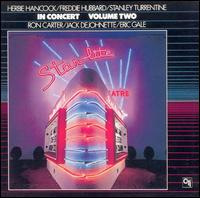With
others | - The Soul of the City (Manny Albam, 1966)
- The Other Side of Abbey Road (George Benson, 1969)
- Out of This World (Walter Benton, 1960)
- True Blue (Tina Brooks, 1960)
- God Bless the Child (Kenny Burrell, 1971)
- Cables' Vision (George Cables, 1979)
- Droppin' Things (Betty Carter, 1990)
- Free Jazz (Ornette Coleman, 1960)
- Olé Coltrane (John Coltrane, 1961)
- Africa/Brass (John Coltrane, 1961)
- Ascension (John Coltrane, 1965)
- Muses for Richard Davis (1969)
- Outward Bound (Eric Dolphy, 1960)
- Out to Lunch! (Eric Dolphy, 1964)
- Undercurrent (Kenny Drew, 1960)
- Leaving This Planet (Charles Earland, 1973)
- Booker 'n' Brass (Booker Ervin, 1967)
- Interplay (Bill Evans, 1962)
- Sonic Text (Joe Farrell, 1979)
- Boss of the Soul-Stream Trombone (Curtis Fuller, 1960)
- Soul Trombone (Curtis Fuller, 1961)
- Cabin in the Sky (Curtis Fuller, 1962)
- Take a Number from 1 to 10 (Benny Golson, 1961)
- Pop + Jazz = Swing (Benny Golson, 1962)
- Slide Hampton and His Horn of Plenty (1959)
- Sister Salvation (Slide Hampton, 1960)
- Drum Suite (Slide Hampton, 1962)
- The Quota (Jimmy Heath, 1961)
- Triple Threat (Jimmy Heath, 1962)
- Big Band (Joe Henderson, 1996)
- Pax (Andrew Hill, 1965)
- Compulsion (Andrew Hill, 1965)
- Sunflower (Milt Jackson, 1972)
- Goodbye (Milt Jackson, 1973)
- 52nd Street (Billy Joel, 1978)
- Reg Strikes Back (Elton John, 1988)
- J.J. Inc. (J.J. Johnson, 1960)
- Echoes of an Era (Chaka Khan, 1982)
- Essence (John Lewis, 1960–62)
- Water Sign (Jeff Lorber, 1979)
- Doin' the Thang! (Ronnie Mathews, 1963)
- Bluesnik (Jackie McLean, 1961)
- MJQ & Friends: A 40th Anniversary Celebration (Modern Jazz Quartet, 1994)
- Fingerpickin' (Wes Montgomery, 1958)
- Roll Call (Hank Mobley, 1960)
- The Blues and the Abstract Truth (Oliver Nelson, 1961)
- Sweet Honey Bee (Duke Pearson, 1966)
- The Right Touch (Duke Pearson, 1967)
- Contours (Sam Rivers, 1965)
- Drums Unlimited (Max Roach, 1965)
- East Broadway Run Down (Sonny Rollins, 1966)
- Numbers (Rufus, 1978)
- Once a Thief and Other Themes (Lalo Schifrin, 1965)
- Giant Box (Don Sebesky, 1973)
- Sugar (Stanley Turrentine, 1970)
- Together (McCoy Tyner, 1978)
- Quartets 4 X 4 (McCoy Tyner, 1980)
- Soundscapes (Cedar Walton, 1980)
- Uhuru Afrika (Randy Weston, 1960)
- Blue Moses (Randy Weston, 1972)
|
|---|
